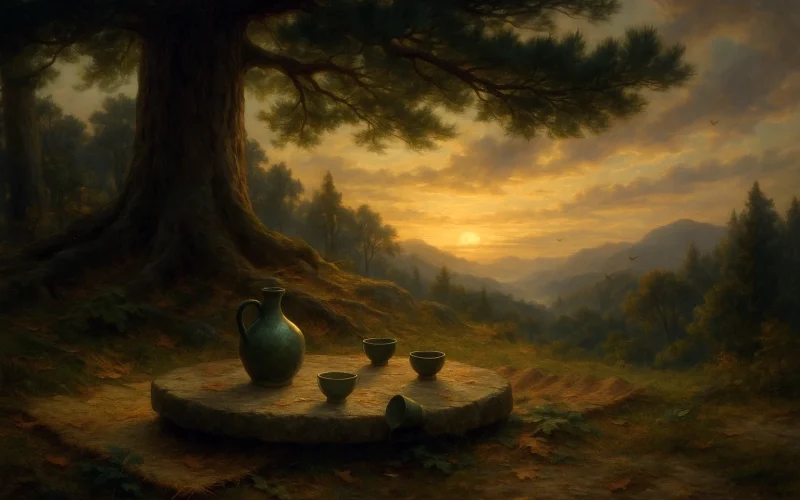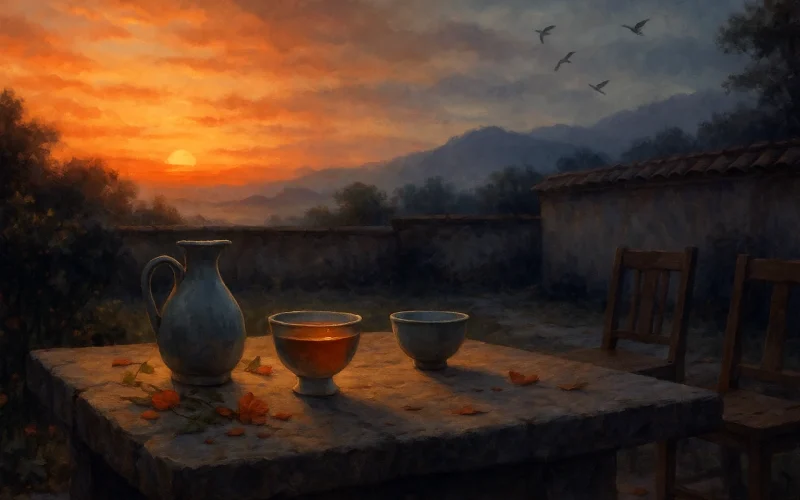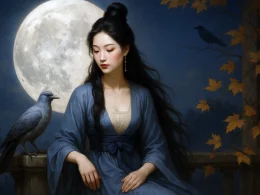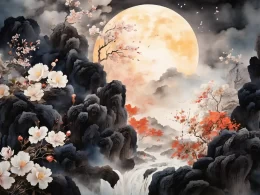Old friends who know my love of wine
Come, bottle in hand, to see me.
We sit on bushes beneath the pine,
After a few rounds drunk are we.
All at once old men chat away;
Out of tune we pass round the cup.
We don't know who we are today.
Can we value what's down or up?
Long, long we are lost in the drink;
In the delight of wine we sink.
Original Poem
「饮酒 · 其十四」
陶渊明
故人赏我趣,挈壶相与至。
班荆坐松下,数斟已复醉。
父老杂乱言,觞酌失行次。
不觉知有我,安知物为贵?
悠悠迷所留,酒中有深味。
Interpretation
Composed after Tao Yuanming's retreat to rural life, this poem depicts a gathering with old friends in the mountains, where wine-induced epiphanies reveal the poet's profound reflections on nature, human existence, and being. Its apparent simplicity belies enduring wisdom, with intoxication becoming a vessel for transcendent thought, embodying a state of unity between self and cosmos.
First Couplet: "故人赏我趣,挈壶相与至。"
Gùrén shǎng wǒ qù, qiè hú xiāng yǔ zhì.
Old friends who share my rustic tastes Come bearing jars to this retreat.
"Share my tastes" (赏我趣) establishes their bond beyond worldly success, while "bearing jars" (挈壶) signals the pure, unpretentious nature of their reunion, setting the poem's authentic tone.
Second Couplet: "班荆坐松下,数斟已复醉。"
Bān jīng zuò sōng xià, shǔ zhēn yǐ fù zuì.
On pine-shaded ground we spread rough mats; A few rounds bring us to mild bliss.
The ritual of "spreading rough mats" (班荆) under pines merges rustic courtesy with natural simplicity, while "mild bliss" (复醉) suggests gradual, joyful surrender to the moment's flow.
Third Couplet: "父老杂乱言,觞酌失行次。"
Fùlǎo záluàn yán, shāng zhuó shī xíng cì.
Village elders chatter freely now, Wine cups passing without rank.
The scene expands to include country folk, their "free chatter" (杂乱言) and disregard for drinking etiquette (失行次) embodying unconstrained rural authenticity.
Fourth Couplet: "不觉知有我,安知物为贵?"
Bùjué zhī yǒu wǒ, ān zhī wù wéi guì?
Self-awareness fades in this delight— Why value worldly things at all?
The philosophical crux: ego dissolution ("forget self" 不觉知有我) enables transcendence of material values (安知物为贵), achieving spiritual liberation through communal ecstasy.
Fifth Couplet: "悠悠迷所留,酒中有深味。"
Yōuyōu mí suǒ liú, jiǔ zhōng yǒu shēn wèi.
Adrift in lingering rapture's haze, We taste wine's deepest mystery.
"Drifting" (悠悠) describes the trance-like state where wine's "deep flavor" (深味) becomes metaphysical—a medium for cosmic connection and existential insight.
Holistic Appreciation
The poem depicts a rustic drinking gathering among friends through unadorned language and natural rhythm, beginning with simple, authentic social scenes before gradually ascending to a spiritual realm of self-oblivion and unity with nature. Through portraying shared drinks with friends and villagers, the poet not only captures the modest joys of rural life but also reflects his liberated spiritual world transcending mundane concerns. The lines "Why value worldly things?" and "Wine contains profound flavor" particularly stand out, naturally unfolding philosophical contemplation that reveals enlightened transcendence within apparent simplicity - a state of wisdom shining through serene detachment.
Artistic Merits
The poem's plain language belies profound meaning, using concrete drinking scenes to progressively elevate toward philosophical revelation. Following the thread of intoxication from "shared delight" to "self-forgetting" and ultimately "profound flavor," the poet weaves an idyllic tableau where emotion and reason perfectly harmonize. Blending narration with reflection and concealing profound truths within apparent simplicity, the work exemplifies Tao Yuanming's signature poetic virtues of "natural innocence" and "subtle profundity." The seamless integration of rural imagery with metaphysical insight creates a uniquely compelling aesthetic that is both accessible and deeply meaningful.
Insights
This poem offers vital insights for navigating our chaotic world: the importance of preserving pure life pleasures and spiritual pursuits. The "profound flavor in wine" symbolizes not just appreciation for life's authentic essence, but reminds us that true value lies not in material worth but in mental clarity and spiritual freedom. Through demonstrating harmonious coexistence with nature and detached attitude toward possessions, Tao Yuanming paints an ideal vision of human fulfillment that remains profoundly relevant. The work ultimately suggests that enlightenment often comes through simple, mindful living rather than grandiose achievements.
Poem translator
Xu Yuanchong (许渊冲)
About the poet

Tao Yuanming(陶渊明), 365 – 427 CE, was a poet, literary figure, fu writer, and essayist active during the late Eastern Jin and early Liu Song dynasties. Born in Chaisang (near present-day Jiujiang, Jiangxi Province), he pioneered a new genre of pastoral-themed literature, expressing profound philosophical insights through simple language. His poetic style became an enduring aesthetic standard in classical Chinese poetry.












